At 20-Years-Old, Nupol Kiazolu Has Already Organized Hundreds of Marches. She’s Just Getting Started.
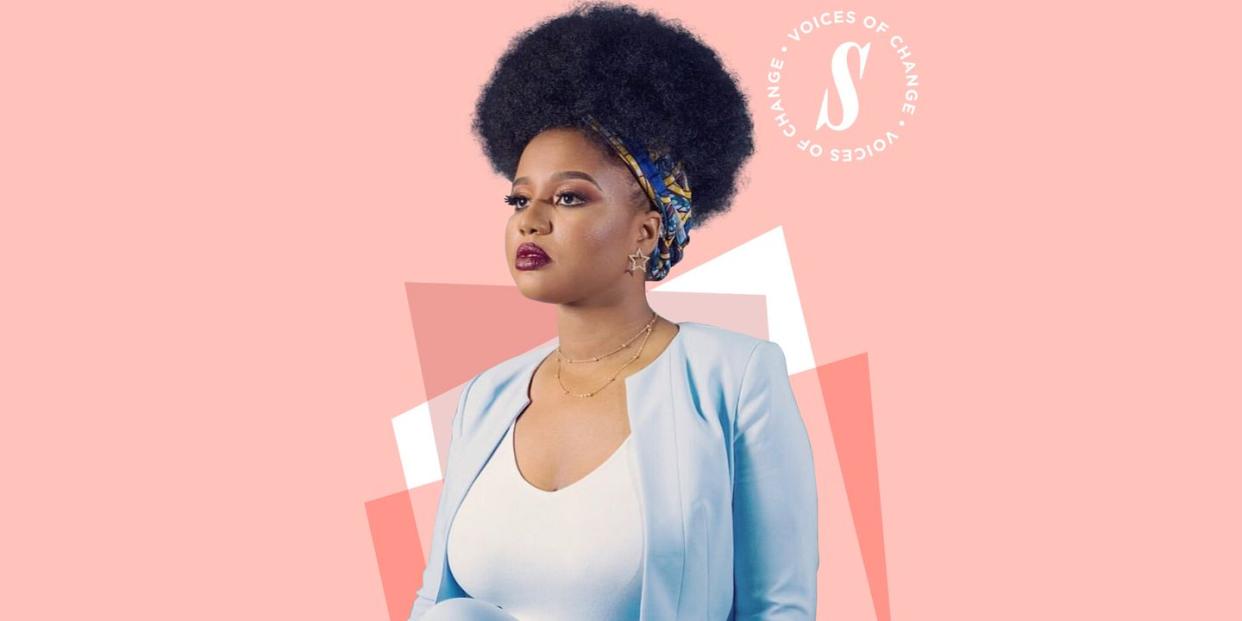
Even during the most challenging times in history, it's important to highlight those who are continuing to follow their dreams and take strides to make the world a better place. Because of that, each month, Seventeen is honoring one young person as a Voice of Change, someone who is making a difference in their community and the world at large.
Nine months following the murder of George Floyd, which sparked protests and marches around the country, the Black Lives Matter movement is still going strong. Everyday, men and women continue to take to the streets, protesting and fighting to keep names like George Floyd and Breonna Taylor alive. Through it all, Nupol Kiazolu is right there with them, leading the way and inspiring others. The 20-year-old junior at Hampton University, a historically black university in Hampton, Virginia, began her career as an activist when she was just 12 years old. Since then, she served as the president of the Black Lives Matter Youth Coalition and Black Lives Matter Greater New York, became Miss Liberia USA, and organized hundreds of marches.
Nupol has effected so much change in her eight and a half years as an activist and she's just getting started. It is because of all of this and more that Nupol is being honored as one of Seventeen's Voices of Change. Nupol found time between organizing and midterms to talk with us about what drove her to activism, what it was like to enter into the pageant world, and what being a Voice of Change means to her.
17: How did you initially get involved in activism?
Nupol Kiazolu: The murder of Trayvon Martin is what originally pushed me into activism. I was 12 years old and in the deep South [at Stone Mountain Middle School in Georgia] at the time of his death. When I first found out, my immediate emotions were anger and confusion. For the first time in my life, I had to come face to face with what it means to be a young Black person in America and, although I couldn't fully articulate how I felt at the time, I knew that I was angry, confused, and hurt, and I had to do something. So, I came up with the idea to hold a silent protest at my school. I took a gray hoodie and I taped a message to my back stating 'Do I look suspicious?' I got some Skittles and iced tea from 7-11 to represent what Trayvon had in his hand at the time of his death.
When I got to school, it caused a lot of controversy among the staff and teachers. I was in a predominately white area at the time, so a lot of people felt I was being too political. Nonetheless, I persisted and, again, the next day, I wore the hoodie and carried the Skittles and iced tea. I ended up getting written up for suspension and before I went to the principal's office, I went to my math teacher who was my only ally at the time. This lady literally risked her entire career by marching down to the principal's office with me with her hoodie on, and we debated back and forth with the principal. Instead of suspending me, he sent me home to do my research and have my case ready for him the following morning. So, that's what I did. I looked up my rights as a middle school student in Georgia, my rights as a middle school student in the US, my first amendment rights. Then, I came across the Supreme Court case Tinker v. Des Moines, which in short is a case that established the right for students to peacefully organize within school grounds. That was the focal point of my argument the following morning and we ended up winning the case.
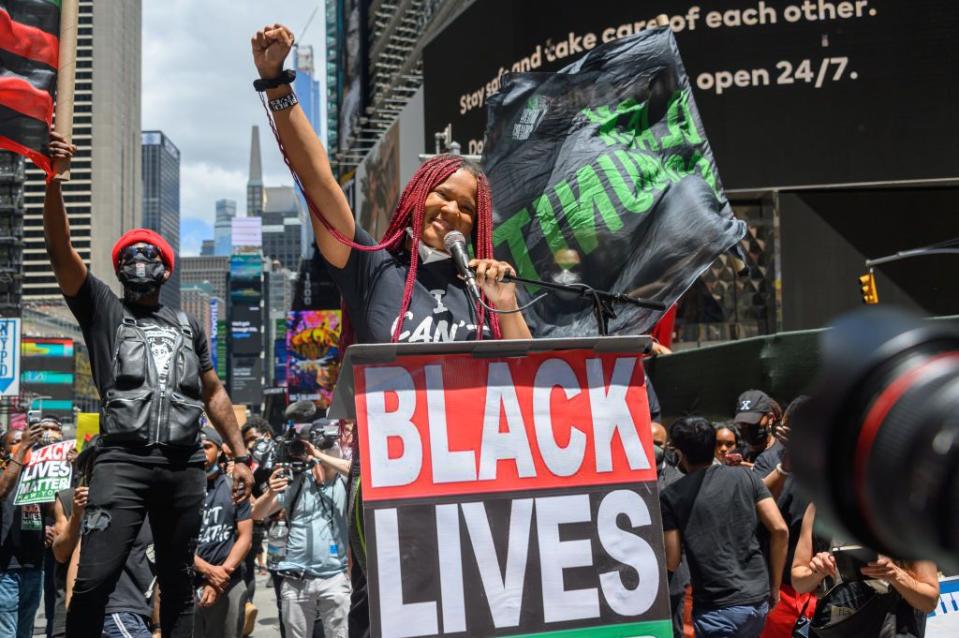
By the time we got out of his office, it was lunch time and we went to the cafeteria and literally every single student in there had their hoodies on with the same exact message. That's when I knew that being an activist and organizer was my calling. My teacher and I just stood there in shock and cried. I grew up as someone who was really really bullied, so I didn't think I'd had an impact on my peers, but it just showed me that it doesn't matter where you come from or who you are, your voice does matter and you're more than capable of making change.
17: How have you grown as an activist since?
NK: That was my first act of activism and protest. I didn't even know that it was considered activism. I was just doing the right thing, that's it. After that, I started studying the movement and its history and, at 13 years old, I decided that this is something I'm going to commit my life to.
17: You were part of a major protest in Louisville following Breonna Taylor's death last summer, what happened?
NK: When I heard about Breonna Taylor's death, it broke me down to my core. She's my gemini twin, we're both June babies and I saw so much of myself in her. I believe Black women all across this country can resonate with her story. It doesn't matter if you knew her personally when she was alive, we are all a family and a community. So, it was like we lost one of our own. I had to show up. I had to do something. Black women really rallied to get Breonna's name out there and to have her name in the mainstream media because, oftentimes, Black women are overlooked in this fight against police brutality. Kimberlé Crenshaw coined the saying, "Say Her Name" because of the erasure of Black women in this fight for Black liberation and against police brutality. So, Black women like myself organized and we continuously organize to demand justice for Breonna Taylor.
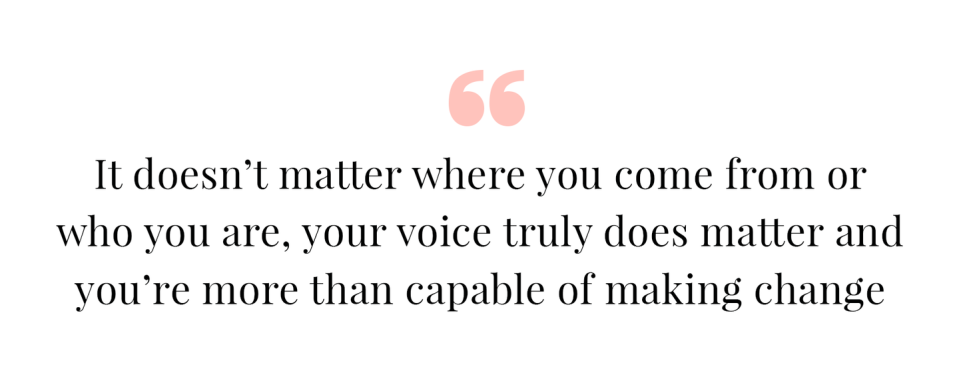
I went down to Louisville for a research project I was working on called Violence Intervention Prevention Program. We're conducting research on different communities across the country to come up with sustainable solutions to combat the things that we're facing today. Nobody was there to get locked up. That was not on the agenda. I got arrested for sitting down on a lawn non-violently. I was just sitting there and the police came and arrested me. I spent about 13-15 hours in jail. They didn't give us any food, water, or any PPE supplies. My mom had to keep calling and asking, "Why are you starving them? Why can't y'all even give them water?" They finally caved in about thirty minutes to an hour before we left and gave us some stale bread and water.
Sitting in that jail cell radicalized me in a good way. It opened my eyes to the harsh reality of the prison industrial complex in this country and I was only there for about 15 hours. Imagine the people who actually have to stay there for months or years and how they're treated. So, it opened my eyes to how much more work we have to do. As traumatic as that experience was, it was inspiring and it forced me to come to terms with more uncomfortable realities in this country and it gave me that boost to keep this fight going.
17: What was it like to see what happened to those who attacked the Capitol after experiencing what happened in Louisville?
NK: Daniel Cameron, the Kentucky attorney general, was not even home and we weren't trying to run up on him like the US Capitol, we were having a non-violent sit in. Sit ins are nothing new. They are demonstrations that have been a part of the movement since its inception. What we were doing was nonviolent. We were sitting and they gave us felonies, but they allowed hundreds of thousands of domestic terrorists ransack the US Capitol with little to no repercussions. What enraged me the most about the US Capitol attacks is that I know, if that was me, my Black body would have been shot down immediately. They wouldn't have even let me touch the grass. It was so enraging as a Black organizer. I've seen so much and never in my 20 years of life did I think I would see that. People just walked out with things from Nancy Pelosi's office. That goes to show that it was not just white privilege, it was white supremacy operating in real time.
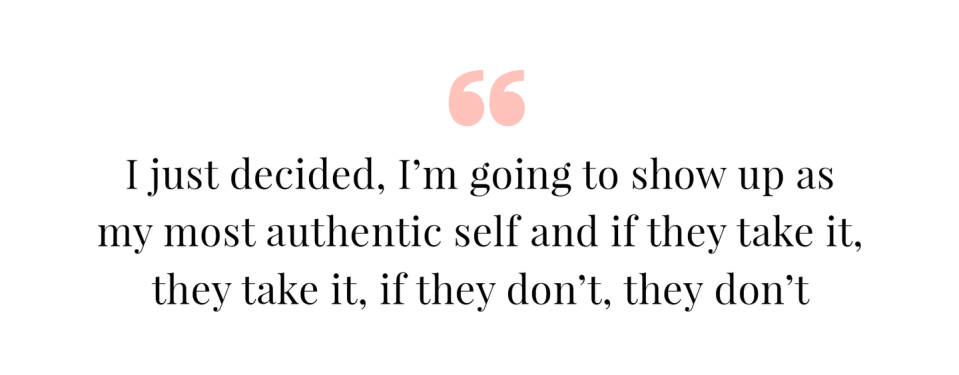
17: As you continue to demand justice for Breonna Taylor, what are you organizing?
NK: In terms of continuous organizing for Breonna Taylor, the marches have not stopped in New York City and across the country. There are organizers out in Louisville, Kentucky who have been putting their bodies on the front lines 24/7. It's been over 300 days and they're still outside. So, I just want to take a moment to highlight the organizers in Louisville that are doing that ground work, that live there every single day and have to deal with the Louisville Metro Police Department, but yet are still outside and still keeping Breonna's name alive.
17: What inspired you to get involved in the pageant world?
NK: I've always been someone who has been interested in pageantry. When I was little, I used to binge watch Toddlers & Tiaras and the Miss America and Miss USA pageants. For a long time, though, I didn't have the confidence to do pageants myself. I struggled with my weight for a while. I didn't think the pageant world would accept people that looked like me. When I turned, 19, though, I was able to learn to love myself and every single curve on me. Now, I love who I am and I just decided, I'm going to show up as my most authentic self and if they take it, they take it, if they don't, they don't.
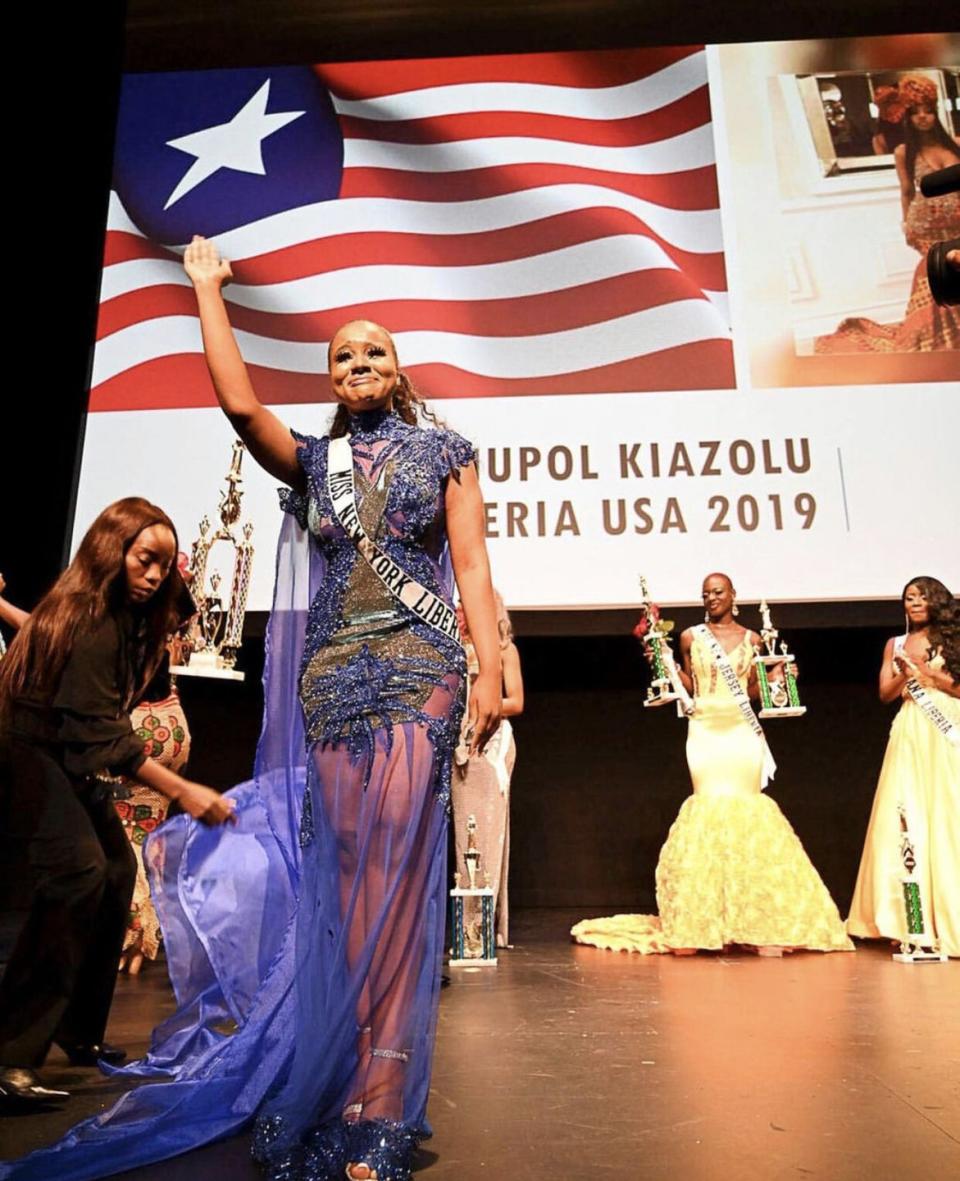
Well, I ended up winning. I didn't have any preparation. A previous contestant gave me some tips two days before pageant week started, but outside of that, I couldn't afford a coach or anything. So, I was just going in there, hoping for the best. When I was speaking on stage, I thought to myself, "You just have to treat this like you're speaking at a protest or something. You have to show up, be yourself, and inspire people."
I'm definitely not the stereotypical pageant queen, but I'm still the reigning Miss Liberia USA. It's a pageant for people of Liberian dissent that reside in the United States. I'm just showing people that you can be an activist and organizer and still pursue your other dreams. It doesn't take away from the work you do. If anything, it contributes to it. People think activists are these stoic figures that don't have lives and have to be perfect all the time, but that's not the case, especially for young folks. We're young, we're still growing, we're still learning. We're going to make mistakes. We're not always going to say the right thing and that's OK. As long as you learn from those mistakes and take accountability and move forward, that's what matters. So, I'm just showing people that you can be whoever you want to be in this world and the multifacetedness of my life really reflects that and I'm happy that inspires so many people.
17: How do you balance doing all of this while being a full time student?
NK: Every time somebody brings that up I'm like, "Oh yeah, and I'm literally a full time student." I'm taking 18 hours of classes per week right now at Hampton University, which is the maximum amount you can take before they start charging you extra. I'm a political science, pre-law major getting ready for law school so I'm preparing for the LSAT right now and I'm in law classes that are like three hours long. In between those classes, I'm doing interviews and meetings and organizing. I have an organizing meeting after this for a protest for a young black teen who was killed last month. His name is Xzavier Hill. He's my birthday twin. We're exactly two years apart so this case hits home on a different level for me. He was killed out in Virginia by the state police. Unarmed. So, yeah, my life is crazy. I don't know how I do it. It's about time management and having a solid team around me to keep my head above water when I start to feel overwhelmed.

17: What is you ultimate career goal?
NK: I'm definitely working toward becoming president one day. It's been my goal since I was a little girl. I've always loved politics. There's this funny story my mom tells. I was five years old and my mom's best friend came in and she saw me watching CNN and she was like, "Why is she watching CNN at five years old?" So, she tried to turn off the TV and I literally threw a fit. I've always been someone who's politically engaged, even before I could contextualize what political engagement was. I want to see a more equitable and just America where your success isn't determined by your zip code or locality. I believe that we're working toward that because of the people we have in this generation. Gen Z is really changing the world.
17: What does being a Voice of Change mean to you?
NK: For me, being a Voice of Change is inspiring because I know how far I've come. Three years ago, I was in a domestic violence shelter with my mom and five younger brothers. From there, I was running to protests and organizing meetings and town halls, helping people and advocating for people when I needed help myself. So, just reflecting on my journey and seeing so many people from my community in Brownsville, Brooklyn and all around the world view me as a Voice of Change is something that inspires me, personally. I use my story as a testimony to show people that it's not about where you start, it's how you finish that matters the most. There were a lot of people who didn't believe in me. I'm a young Black woman from the hood, from the poorest congressional district in Brooklyn. I had all odds stacked against me and I'm still fighting those barriers, but because I believed in myself and what I was fighting for, I continuously pushed forward. Now, I'm here. So, I just want people to understand that you are capable of effectuating change if you believe in yourself first and foremost and that's what I believe being a Voice of Change means to me.
Parts of this interview has been edited and condensed for clarity.
You Might Also Like
